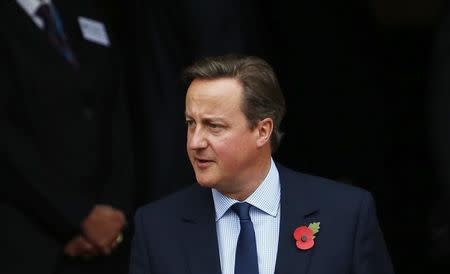Britain's Cameron breaks cover on EU, says outsider Norway no model

By Kylie MacLellan LONDON (Reuters) - British Prime Minister David Cameron on Wednesday launched his most open defence to date of his country remaining in the European Union, telling Eurosceptics that EU outsider Norway was no model to emulate. Speaking in parliament ahead of a trip to Iceland where he is expected to make the same point, Cameron said he would "guide very strongly against" seeing Britain's European future being akin to that of Norway, a successful economy that exists closely with but outside the bloc. "Some people arguing for Britain to leave the European Union ... have particularly pointed to the position of Norway saying that is a good outcome, Cameron said. "Norway actually pays as much per head to the EU as we do, they actually take twice as many per head migrants as we do in this country, but of course they have no seat at the table, no ability to negotiate." Norway has rejected EU membership in referendums twice. Along with Iceland and Lichtenstein it has a European Economic Area agreement that gives it access to the bloc's single market. But in exchange it accepts the EU's principles of freedom of movement of goods, services, capital and people as well as rules governing, among other things, employment law and competition. It also contributes hundreds of millions of euros to the EU budget. British and EU officials highlighted Britain's current power to shape EU rules when the EU executive unveiled new proposals for improving Europe's single market in services on Wednesday. They said it would cut red tape and meet many of Britain's demands for better market access for its large services sector. The plans form part of the European Commission's annual work programme, which Cameron's Europe minister said reflected British efforts to make the EU more competitive. Until Wednesday Cameron had avoided addressing the arguments for and against EU membership, an issue that will be put to a referendum by the end of 2017. But with opinion polls showing a narrowing of support for the bloc versus leaving, he is under increased pressure to take on the Eurosceptics directly. Cameron is seeking to renegotiate the terms of Britain's EU membership and says he wants to stay in a reformed EU. However, he says he rules nothing out if he can't get change on matters such as limiting EU migrants' access to welfare payments. Cameron was later due to travel to a Northern Future Forum in Iceland, attended by the leaders of Iceland, Estonia, Latvia, Lithuania, Denmark, Finland, Norway and Sweden, at which he will discuss his EU reform plans. The pro-EU camp received indirect support on Wednesday from U.S. Trade Secretary Michael Froman, who told Reuters in an interview that the United States would not be keen on pursuing a separate free trade deal with Britain if it left the European Union. CHANGE OF TACK Campaigners for leaving the EU criticised Cameron's change of tack. "It is disappointing that David Cameron is resorting to talking down Britain's chances of getting a good deal outside the EU," said Nigel Lawson, former finance minister under Margaret Thatcher and president of the "out" group Conservatives for Britain. "The government is clearly worried because their EU negotiations do not seem to be going very well." Eurosceptics were quick to highlight a European Parliament vote on Wednesday to increase EU spending plans, partly to deal with the migration crisis, as evidence of waste in Brussels. Pro-Europe group Britain Stronger in Europe said, however, that the lack of alternatives showed Britain was better off in the bloc. "One by one, the alternatives to Britain’s EU membership are falling apart. We'd still pay but would lose our say over many rules, including free movement," the group's executive director, Will Straw, said in a statement. "The real challenge to those who want Britain to walk away from Europe must be: what does their vision of 'out' really look like?" AkzoNobel , one of Europe's largest firms, came out on Wednesday in favour of Britain remaining in the EU and improving it from within, saying the country was too important to be outside the world's largest trading bloc. (Additional reporting by William James in London and Philip Blenkinsop and Alastair Macdonald in Brussels; editing by Jeremy Gaunt and Gareth Jones)

